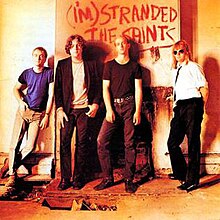(I'm) Stranded
| (I'm) Stranded | ||||
|---|---|---|---|---|
 |
||||
| Studio album by The Saints | ||||
| Released | 21 February 1977 | |||
| Recorded | June, December 1976 Window Studios, Brisbane |
|||
| Genre | Punk rock | |||
| Length | 34:33 | |||
| Label |
EMI (Australia) Harvest (original UK release) Sire (original US release) Captain Oi! (1999 UK CD release) 4 Men with Beards (2003 US LP reissue) |
|||
| Producer | Mark Moffatt, Rod Coe | |||
| The Saints chronology | ||||
|
||||
| Singles from (I'm) Stranded | ||||
|
||||
| Professional ratings | |
|---|---|
| Review scores | |
| Source | Rating |
| AllMusic | |
| Robert Christgau | B+ |
| MustHear | positive |
(I'm) Stranded is the debut album by Australian punk rock group The Saints which was released by EMI on 21 February 1977. Their debut single, "(I'm) Stranded", was issued ahead of the album in September 1976, which Sounds magazine's reviewer, Jonh Ingham, declared was the "Single of this and every week". "Erotic Neurotic" was the second single, which was released in May 1977 and the group relocated to the United Kingdom. In June, bass guitarist Alasdair "Algy" Ward replaced Bradshaw and the group issued a single, "This Perfect Day" in July, which peaked in the Top 40 on the UK Singles Chart.
In May 2001, Australasian Performing Right Association (APRA) celebrated its 75th anniversary and named "(I'm) Stranded" in its Top 30 Australian songs of all time. In 2007, 'I'm Stranded' was one of the first 20 songs added to the National Film and Sound Archive's Sounds of Australia registry. Their debut album was listed at No. 20 in the book, 100 Best Australian Albums, in October 2010.
(I'm) Stranded is the debut album by The Saints which had formed in Brisbane in 1974 with original members Chris Bailey (singer-songwriter, later guitarist), Ed Kuepper (guitarist-songwriter), and Ivor Hay (drummer). In 1975, Kym Bradshaw joined on bass guitar. Contemporaneous with Ramones, the group were employing the fast tempos, raucous vocals and "buzz saw" guitar that characterised early punk rock. Kuepper explained that they played faster and faster as they were nervous in front of audiences. According to Australian rock historian, Ian McFarlane, they had developed their "own distinctive sound as defined by Kuepper's frenetic, whirlwind guitar style and Bailey's arrogant snarl".
...
Wikipedia
